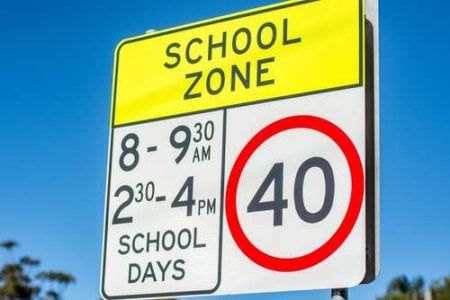Australian researchers push for 'equitable', income-based fines for traffic penalties
By
Danielle F.
- Replies 18
In a world where the cost of living continues to soar, the concept of fairness is more important than ever.
When it comes to the law, the same rules should apply to everyone, but the consequences of breaking those rules could depend on one's financial situation.
Recently, an institute's proposal urged authorities to rethink how it penalises speeding drivers.
Australian states issue traffic penalties at a flat rate, regardless of the offender's financial status.
The Australia Institute, a leading think tank, has criticised this approach.
The institute argued that the 'regressive' fines could have varying impacts on individuals depending on their income.
Instead, they proposed making speeding fines proportionate to one's income bracket.
The idea, inspired by a Finnish model, gained traction as a way to address what many saw as an inequity in the current system.
The institute highlighted the Finnish system, where fines were tailored to the driver's monthly income and their financial dependents.
This sliding scale of penalties meant that wealthier individuals could pay more for the same offence than those with less income.
In 2023, a wealthy Finnish driver was fined nearly $200,000 for exceeding the speed limit by 32 km/h.
Meanwhile, the lowest income earners were fined $33 for a minor speeding infraction, with high-income earners to be charged $295 for the same offence.
The argument for income-based fines was not just about fairness; it was also about the effectiveness of the penalty as a deterrent.
High-income earners would only see the fine as a nuisance, but it could go otherwise for others.
'For a person on a low income, speeding fines can be crippling,' The Australia Institute's Research Manager and report co-author Alice Grundy pointed out.
'Proportional speeding fines are more equitable because they ensure the size of the fine is set based on a driver's income.'
Grundy described the current flat-rate system as one that 'effectively criminalises poverty'.
The report also cited the case of a First Nations woman who died in custody after being unable to pay $1000 in fines.
This report was a reminder of how penalties could have life-altering consequences for vulnerable members of society.
Financial Counselling Victoria's Executive Officer Zyl Hovenga-Wauchope echoed the institute's sentiment.
He stated that the current system is at odds with Australia's 'fair go' philosophy.
He suggested that a proportional model would be a significant step towards equity among drivers.
While some viewed an income-based model as' revenue raising', the report suggested that the additional funds could be channelled into community road safety projects.

Have you ever felt the sting of a speeding fine on your wallet? Would the proposed fine system be more fair? Share your thoughts and opinions with us in the comments section below.
When it comes to the law, the same rules should apply to everyone, but the consequences of breaking those rules could depend on one's financial situation.
Recently, an institute's proposal urged authorities to rethink how it penalises speeding drivers.
Australian states issue traffic penalties at a flat rate, regardless of the offender's financial status.
The Australia Institute, a leading think tank, has criticised this approach.
The institute argued that the 'regressive' fines could have varying impacts on individuals depending on their income.
Instead, they proposed making speeding fines proportionate to one's income bracket.
The idea, inspired by a Finnish model, gained traction as a way to address what many saw as an inequity in the current system.
The institute highlighted the Finnish system, where fines were tailored to the driver's monthly income and their financial dependents.
This sliding scale of penalties meant that wealthier individuals could pay more for the same offence than those with less income.
In 2023, a wealthy Finnish driver was fined nearly $200,000 for exceeding the speed limit by 32 km/h.
Meanwhile, the lowest income earners were fined $33 for a minor speeding infraction, with high-income earners to be charged $295 for the same offence.
The argument for income-based fines was not just about fairness; it was also about the effectiveness of the penalty as a deterrent.
High-income earners would only see the fine as a nuisance, but it could go otherwise for others.
'For a person on a low income, speeding fines can be crippling,' The Australia Institute's Research Manager and report co-author Alice Grundy pointed out.
'Proportional speeding fines are more equitable because they ensure the size of the fine is set based on a driver's income.'
Grundy described the current flat-rate system as one that 'effectively criminalises poverty'.
The report also cited the case of a First Nations woman who died in custody after being unable to pay $1000 in fines.
This report was a reminder of how penalties could have life-altering consequences for vulnerable members of society.
Financial Counselling Victoria's Executive Officer Zyl Hovenga-Wauchope echoed the institute's sentiment.
He stated that the current system is at odds with Australia's 'fair go' philosophy.
He suggested that a proportional model would be a significant step towards equity among drivers.
While some viewed an income-based model as' revenue raising', the report suggested that the additional funds could be channelled into community road safety projects.
Key Takeaways
- An institute called for changing Australia's speeding fines to be based on a driver's income, similar to the Finnish model.
- The Australia Institute argued that flat-rate fines for traffic offences have been unfair, especially during the cost-of-living crisis.
- The report highlighted some disparities, where fines could devastate low-income earners while barely affecting wealthy offenders.
- Proposed income-based fines could improve equity. However, some raised concerns about the model as a way to raise revenue.








